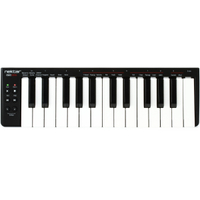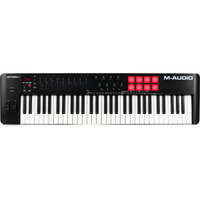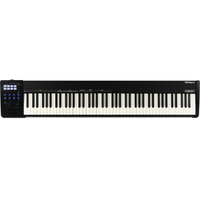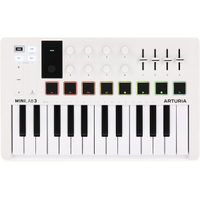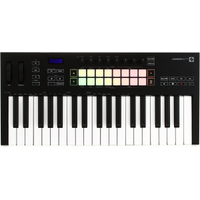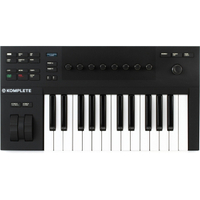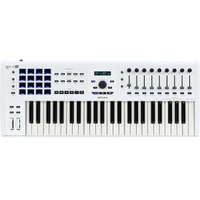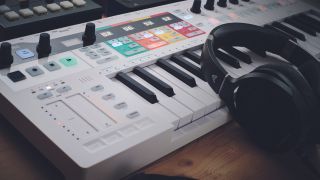
1. The quick list
2. Best overall
3. Best budget
4. Best compact
5. Best for Ableton
6. Best for Logic Pro
7. Best for FL Studio
8. Best with weighted keys
9. Best 49 keys
10. Best for iPad
11. Also tested
12. Buying advice
13. How we test
If you want to make any kind of music via a DAW, then one of the best MIDI keyboards is an essential purchase for your studio setup. Choosing one that's right for you can be difficult though, with a myriad of sizes, styles, DAW-integrations, and brands out there to choose from. To make things easier, we've put together this comprehensive guide with MIDI keyboards chosen by the expert writing team of musicians here at MusicRadar.
There are more MIDI keyboards than ever in 2024, and we've reviewed countless models over the years, leaving us well-positioned to recommend the best of the best. Our team is made up of actual musicians, so we'll test every MIDI keyboard in a variety of DAWs to make sure the integrations are up to scratch, the keybed feels playable, and any pads offer a good feel for knocking out rhythms. We'll also look at the durability of it, particularly if it has features for live use, as it'll need to put up with the rough and tumble of going from show to show.
For those buying for the first time, we've put together a comprehensive buying advice section that answers loads of common questions. You can also check out our best MIDI keyboard for beginners guide for more newbie-friendly options. If you want to see the best MIDI keyboards you can buy right now, then keep on scrolling...
The quick list
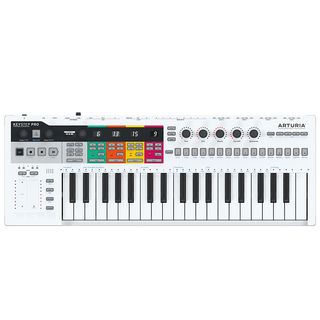
Combining the cross-format analogue and digital sequencing of the BeatStep with a 37-note keyboard, the Arturia Keystep Pro is more than suited for any of your melodic needs. Featuring four sequencing channels, each of which can record a sequence of up to 64 steps, this is a seriously versatile controller.
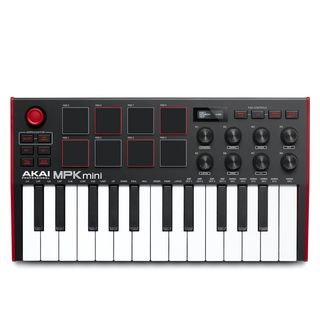
Next up, we have to recommend the Akai MPK Mini Mk3. Put simply, it has everything you’ll need: decent-quality keys, endless rotary knobs, and eight sought-after MPC-style pads for creating beats. For us, the Akai MPK Mini represents fantastic value for money.
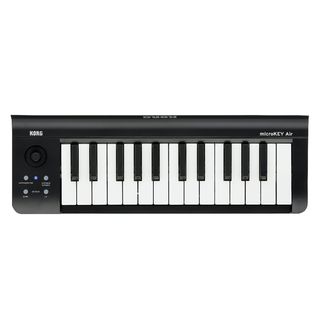
The microKey 2 Air range includes 25-, 37-, 49- and 61-note models, all of which have the advantage of working wirelessly over Bluetooth. If you want to use this feature, you'll have to install a couple of AA batteries, but these last for a good length of time and good old USB bus-powering is also an option.
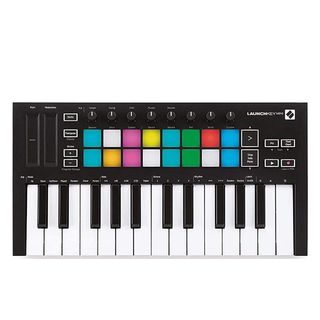
In the compact corner, because of the sheer number of features crammed into such a light, small footprint, our first recommendation is the Novation LaunchKey Mini Mk3. It has instant support for Ableton Live, and handy creative tools like an arpeggiator and chord memory function.
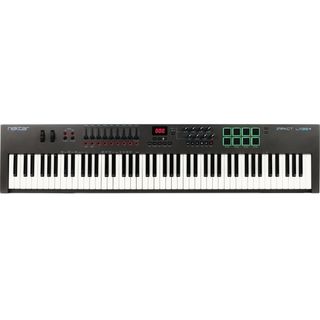
With its second-to-none DAW integration, the Nektar Impact LX88+ is the perfect MIDI keyboard for using with Logic Pro X. Large enough to cover any ground whether you're making type beats or full orchestral scores, there are plenty of sliders and buttons to work with, and it's surprisingly lightweight too.
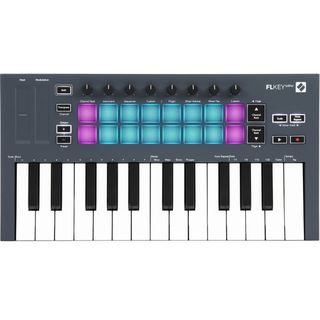
One of very few dedicated controllers for FL Studio, the Novation FLkey Mini packs loads of features into a small package you can take with your laptop, giving you dedicated transport buttons, 16 RGB pads, and plenty of hands-on control for navigating your beats and sessions in FL.
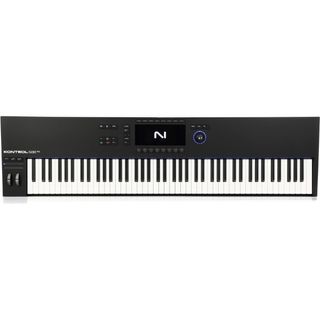
If you're looking for a larger controller, we heartily recommend the Native Instruments Komplete Kontrol S-Series, and in particular the Native Instruments Kontrol S88 Mk 3. It features fully-weighted, excellent keybeds, fantastic styling, wonderful colour screen, and impressive functionality.
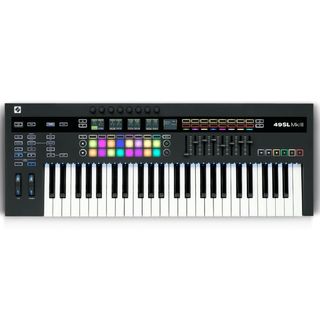
Not only is the Novation 49 SL MkIII a brilliant 49-key MIDI keyboard but it's also got enough features to be used alongside a variety of software and hardware. It will take some learning to get it to fit into your particular setup, but once you get it there few others can compete with this MIDI keyboard.
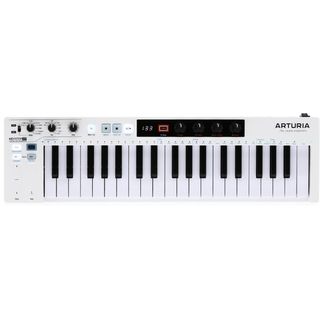
The compact size and full functionality of the Arturia Keystep 37 have it sitting between the Keystep and Keystep Pro, making it perfect for integrating into an iPad-based travel rig. With a sequencer and arpeggiator built in there are a lot of creative options available, with 37 keys for more complex melodies.
Best overall
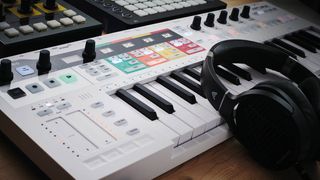
✅ Buy if you want a MIDI keyboard that can do it all: With its mix of analogue and digital ins and outs as well as plenty of creative tools for sequencing, the Keystep Pro is one of the best MIDI keyboards money can buy.
❌ Avoid if you like big keys: The keystep features mini-keys, which may not suit those coming from a piano or synthesizer playing background.
Between their ‘Step’ and ‘Lab’ devices, Arturia has a pretty broad range of controllers, ranging from the simple, budget-friendly MicroLab MIDI keyboard to the multi-format sequencing tools of the BeatStep Pro. Now the KeyStep Pro has arrived to fill one of the few remaining gaps in that line-up; combining the cross-format analogue and digital sequencing of the BeatStep with a 37-note keyboard making it better suited to melodic work.
The KeyStep Pro features four sequencing channels, each of which can record a sequence of up to 64 steps. Each of these is polyphonic, up to 16 notes per step. Tracks 2, 3 and 4 are each equipped with an arpeggiator, while track 1 doubles up as a 24-part drum sequencer.
For melodic sequencing duties and flexible hardware control, we found this to be easily one of the best do-it-all controllers out there right now. Its compact size may deter serious ‘players’ - Novation’s SL Mk3 remains the best CV-equipped device on that front - but modular and hardware-loving musicians will likely lap this one up.
Read the full Arturia Keystep Pro review
Best budget
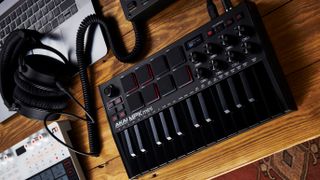
✅ Buy if you're on a budget: With 25 keys, 8 pads, and 8 encoders, the MPK Mini delivers a lot of playability at a relatively small price point.
❌ Avoid if you like a mod wheel: Featuring a thumbstick instead of mod and pitch wheels to save space, not everyone will get along with the MPK Mini.
The Akai MPK Mini Mk3 is, in many ways, the best MIDI keyboard for most people, particularly those looking for a quick and easy way to add melodies, basslines and simple chords to their projects.
For us, what elevates the MPK Mini MK3 from a simple keyboard, is the addition of eight encoder knobs which can be easily mapped to practically any parameter of your DAW, and eight full-sized MPC style drum pads.
What you get, therefore, is a full-service production powerhouse which excels in many different playing and performing situations. We found it to be small enough to be thrown in a backpack, yet contains enough useful features and functions to make it a highly useful addition to any studio.
Read the full Akai MPK Mini Mk3 review
Best compact
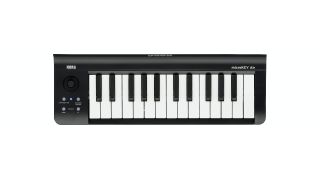
✅ Buy if you're short on space: With its teeny-tiny footprint and wireless connectivity, this mini MIDI keyboard is perfect for those in need of a compact controller.
❌ Avoid if you need lots of transport functions: Due to its small size there's not much in the way of extra controls here, so might not suit those who rely on transport controls.
The microKey 2 Air range includes 25-, 37-, 49- and 61-note models, all of which have the advantage of working wirelessly over Bluetooth. If you want to use this feature you'll have to install a couple of AA batteries, but in our tests these lasted for a good length of time and good old USB bus-powering is also an option.
For those looking for a compact option, it's small enough to take with your laptop in a bag or to use on a tight desktop. The wireless connectivity also saves you space by omitting the need for any cable runs.
The microKey 2 Air 25 isn't the most controller-packed keyboard, but it gives you the basics and plays far better than many of its rivals. In testing, we also found that it's easy to set up and operate, so if you want to free yourself from the tyranny of cables, you've found the MIDI controller keyboard you need.
Read our full Korg microKEY2 Air-25 review
Best for Ableton
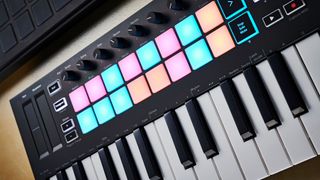
✅ Buy if you use Ableton: Designed to integrate perfectly with Ableton Live, the Novation Launchkey is packed full of features that make using it with Ableton an absolute breeze.
❌ Avoid if you don't use Ableton: It will work with other DAWs, but this is best for those who do the majority of their work in Ableton Live.
Developed primarily for Ableton users and newly updated, this pocket powerhouse is just brimming with features, many of which were missing from the previous version, including - finally - pitch bend and modulation touchstrips, a hardware MIDI out on a TRS jack, an incredibly flexible and versatile arpeggiator, a chord memory feature, and a great, deal-sweetening software bundle.
Of course, the Launchkey Mini Mk3 isn’t exclusive to Ableton, as it plays perfectly nicely with other DAWs too, but if you’re a Live user, it undoubtedly represents the best solution at this price point.
As a general-use MIDI keyboard, we found the Launchkey Mini MK3 to be more than adequate for our dual-octave, travel-friendly needs. If you want a small, velocity-sensitive MIDI keyboard with impressive connectivity, we don't think you can go far wrong with the Launchkey Mini MK3.
Read the full Novation Launchkey Mini Mk3 review
Best for Logic Pro X
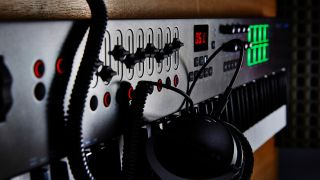
✅ Buy if you use Logic Pro: The Nektar MIDI keyboards have excellent DAW integration, but there aren't many controllers out there that work so well with Logic Pro.
❌ Avoid if you're short on space: With 88 full-size keys this is a pretty big MIDI keyboard, so not for those who are lacking space on their desktop.
Today’s buyers of keyboard controllers are spoilt for choice, but if you’re looking for a full piano-size 88-note MIDI controller, said choices are more limited. One great option is Nektar’s Impact LX88+, which combines an 88-key semi-weighted USB-powered keyboard with extensive DAW control via nine sliders, nine buttons, eight knobs, eight pads, and transport controls.
Nektar's excellent DAW integration has been improved upon massively, with standardised assignments over countless VST instruments making for a seamless workflow. It'll work with many popular DAWs too, including Logic Pro, Reaper, Studio One, Cubase, and loads more.
Despite the number of features, we found the LX88+ to be reasonably compact and light enough to be portable. What’s more, the keys feel good and the mechanical noise is quite low. The LX88+ won’t suit everyone, and some 88-key users will be after a full weighted hammer-action, but at this price, it’s a bargain and well worth testing.
Read the full Nektar Impact LX88+ review
Best for FL Studio
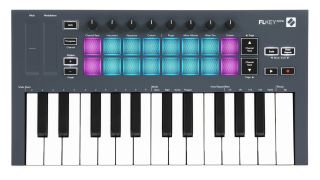
✅ Buy if you use FL Studio: There aren't many dedicated controllers for FL Studio, which makes the FLkey perfect for lovers of Image Line's excellent DAW.
❌ Avoid if you don't use FL: Likewise if you're not an existing FL user, many of the features here won't make sense in a different DAW so best to avoid.
FL Studio has been around for a long time and is regularly used for producing music, yet users have had to wait ages for a dedicated controller. It’s finally here though, and the Novation FLkey Mini is a fantastic MIDI keyboard for those who do their work in FL Studio.
With 16 RGB pads, 10 buttons, 8 encoders, and touch pads for modulation and pitch shifting, Novation has crammed a lot into this mini MIDI controller, but it never feels cramped working on it. The mini-keys are surprisingly playable despite the size and touch-sensitive too which is great for adding extra feel to your melodies.
Dedicated preset buttons are a godsend for auditioning instruments, allowing you to cycle through without reaching for the mouse. Alongside those you also get buttons for Channel Racks, transport control, the Score Log, and undo/redo. There might not be much choice for dedicated FL controllers, but thankfully this one is absolutely brilliant.
Read our full Novation FLkey Mini review
Best with weighted keys
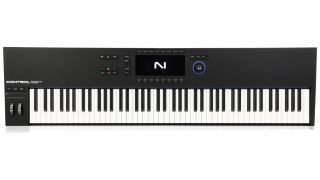
✅ Buy if you want a piano-like feel: With 88 full-size, weighted, velocity-sensitive keys that feature aftertouch, the S88 is perfect for those who are coming from a piano or synth-playing background.
❌ Avoid if you're on a budget: All that lovely keybed feel comes at a price, so you won't want to look at the price of this MIDI keyboard if your budget is tight.
The Komplete Kontrol S88 is a smart MIDI keyboard controller that offers pre-mapped control of NI's Komplete instruments and any third-party plugins that support the NKS standard. In comparison to its predecessor, the Komplete Kontrol MkIII removes the two high-resolution colour screens, opting for a single high-resolution full-color along with 29 additional function buttons. There’s tighter DAW and Maschine integration, too, making it possible to mix, navigate, and edit projects from the hardware.
As before, there’s a Fatar keybed and Light Guide, and in our tests, we welcomed the arrival of proper pitch and mod wheels rather than touchstrips. That said, a single horizontal touch strip is supplied and can be used for additional expression. If you liked the idea of Komplete Kontrol the first time around, the good news is that there’s even more to like about it now.
You can do so much more from the device itself, with better visual feedback and much deeper levels of integration front and centre of its workflow. If you’re already wedded to the Komplete software package, nothing will help you work with it as musically as Komplete Kontrol MkII.
Read our full Native Instruments Kontrol S61 review
Best 49 keys
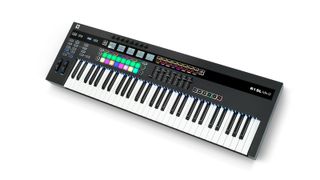
✅ Buy if you want 49 keys: With 49 keys and endless additional controls, the Novation 49 SL gives the perfect balance between compact usability and full functionality.
❌ Avoid if you like randomization tools: Some MIDI keyboards at this level will give you randomization tools but these are notably absent from this particular model.
Sure, you can plug the SL MkIII into a computer and use it to control your DAW, but with an eight-channel onboard sequencer and multiple forms of digital and analogue output, this latest SL really can do much more besides. Novation has done an excellent job in making setup as hassle free as possible, but given how adaptable the SL MkIII is, you’ll still need to spend some time configuring it to best adapt it to your own setup.
We found that it doesn’t quite match the plug-and-play immediacy of NI's Komplete Kontrol system, but offers much more flexibility for interfacing hardware and software. The ability to sequence and control analogue hardware, MIDI-equipped instruments, plugins and your DAW all from one interface and clock source is excellent, and if you dig into the SL MkIII’s versatile workflow, and you’ll find that there’s a deep well of creative possibilities just waiting to be explored.
Read the full Novation 49 SL MkIII review
Best for iPad
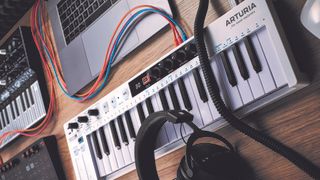
✅ Buy if you want 49 keys: With 49 keys and endless additional controls, the Novation 49 SL gives the perfect balance between compact usability and full functionality.
❌ Avoid if you like randomization tools: Some MIDI keyboards at this level will give you randomization tools but these are notably absent from this particular model.
Sitting nicely between the Keystep and Keystep Pro, the Arturia Keystep 37 has enough features of its own to be classed as an upgrade over the original - and much-loved - model. The expanded 37 key section allows more complex patterns and melodies to be played, while adding four assignable encoder knobs - with visual feedback - offers real-time feedback on your DAW parameters.
The sequencer was a joy for us to use, with the ability to program up to 64 steps directly onto the keyboard itself. This, along with the arpeggiator, can be used within your DAW or to control external hardware or modular synths making it a versatile studio workhorse which suits several different workflows.
We love the small size of the Keystep 37, which nicely bridges that gap between playability and compactness. Perfect for a travel rig or just the musician on the move, this superb MIDI keyboard is matches creativity with functionality brilliantly.
Read the full Arturia Keystep 37 review
Also tested
Buying advice
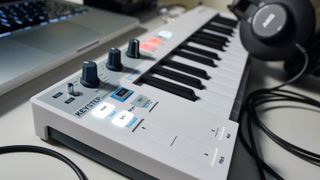
What key size do I need?
For simple inputting of drum beats, simple bass and melody lines and basic chords, smaller MIDI controllers with mini keys should do the job just fine. These have the advantage of being cheaper and more portable than their larger brethren and take up a smaller footprint on your work surface. These days, some people find that mini keys can be just as responsive and easy to play as full-size versions.
If, however, you’re coming from a piano or keyboard background, you will possibly require the more traditional playing experience provided by full-sized weighted keys. Thankfully, there are options for everyone.
How many keys do I need?
The best MIDI keyboards featured here come with octave shift buttons, meaning that the full range of note pitches is accessible even from a 25-key device, just by pressing a couple of buttons. That said, if you’re a more advanced player, or want to learn how to play two-handed, it’s better to go for a four octave (49-note) or five octave (61-note) keyboard. If space isn’t an issue, you can even opt for an 88-key, piano-sized controller if desired. For basic melodies and chords, a smaller keyboard will work just fine though.
MIDI controller connectivity: what you need to know
MusicRadar's got your back
With a lot of producers now working ‘in-the-box’ on a single computer or laptop, you don’t necessarily need a MIDI output unless you have some hardware MIDI synths to connect it to, but some controllers do come with traditional 5-pin MIDI out ports. Smaller, mini jack TRS MIDI outputs are also becoming more popular and offer the same functionality. All controllers in this guide can be powered via the USB port, and if you want to play proper piano parts, a sustain pedal input is a must.
Understanding DAW Integration
Being able to control the transport of your DAW and adjust the parameters of your software instruments from your keyboard rather than your computer is always handy. Once you’ve added remote transport - i.e. via a physical keyboard or controller - you’ll struggle to go back to your mouse for actions like playing, pausing and record arming. If you stick to one DAW and find a controller which boasts deep integration - and many do nowadays - then you’re in for a treat.
How we test
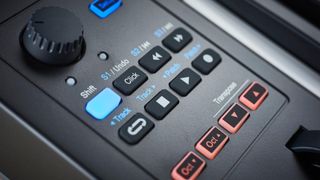
MIDI keyboard controllers come in all shapes and sizes, from small-form desktop units with few controls, right up to 88-note larger keyboards with weighted piano-action style keys. Obviously price is a factor, so we weigh up all of the controls – knobs, sliders, pads and keys – versus the price paid and what style of player the keyboards are aimed at. This can range from the mobile producer, who just needs a small wired or wireless keyboard to throw into a shoulder bag, to the more advanced player who requires the aforementioned professional standard keyboard and where mobility is not so paramount.
Like audio interfaces, MIDI keyboards should be easy to set up – hopefully plug and play – and many also come with software bundles to get you up and running in music production. Again we'll look at each of these bundles which usually represent hundreds of $/£ of software, seemingly thrown in for free, to see how they really do shape up.
Finally, of course, the actual controls and keyboards are also tested to see how responsive they can be. Keyboards, particularly at the lower price point, can be very cheap in feel so we also test how well they play for velocity (volume) and aftertouch (when you press the keys down further to trigger different sounds and effects).
It's fair to say that the more you pay, the better and more piano-like this response, and the more controls you get, although as with cheap audio interfaces, there are some great controllers out there for less than $/£100.
Read more about how we test music making gear and services at MusicRadar.
Related buyer's guides
- Start creating with the best beginner MIDI keyboards
- Our pick of the best studio monitors for home recording
- Get into your mix with the best studio headphones for music making
- The best MIDI pad controllers for beatmaking and sequencing
- Explore the best iPads for musicians and producers
